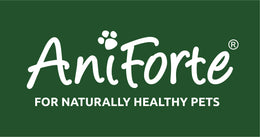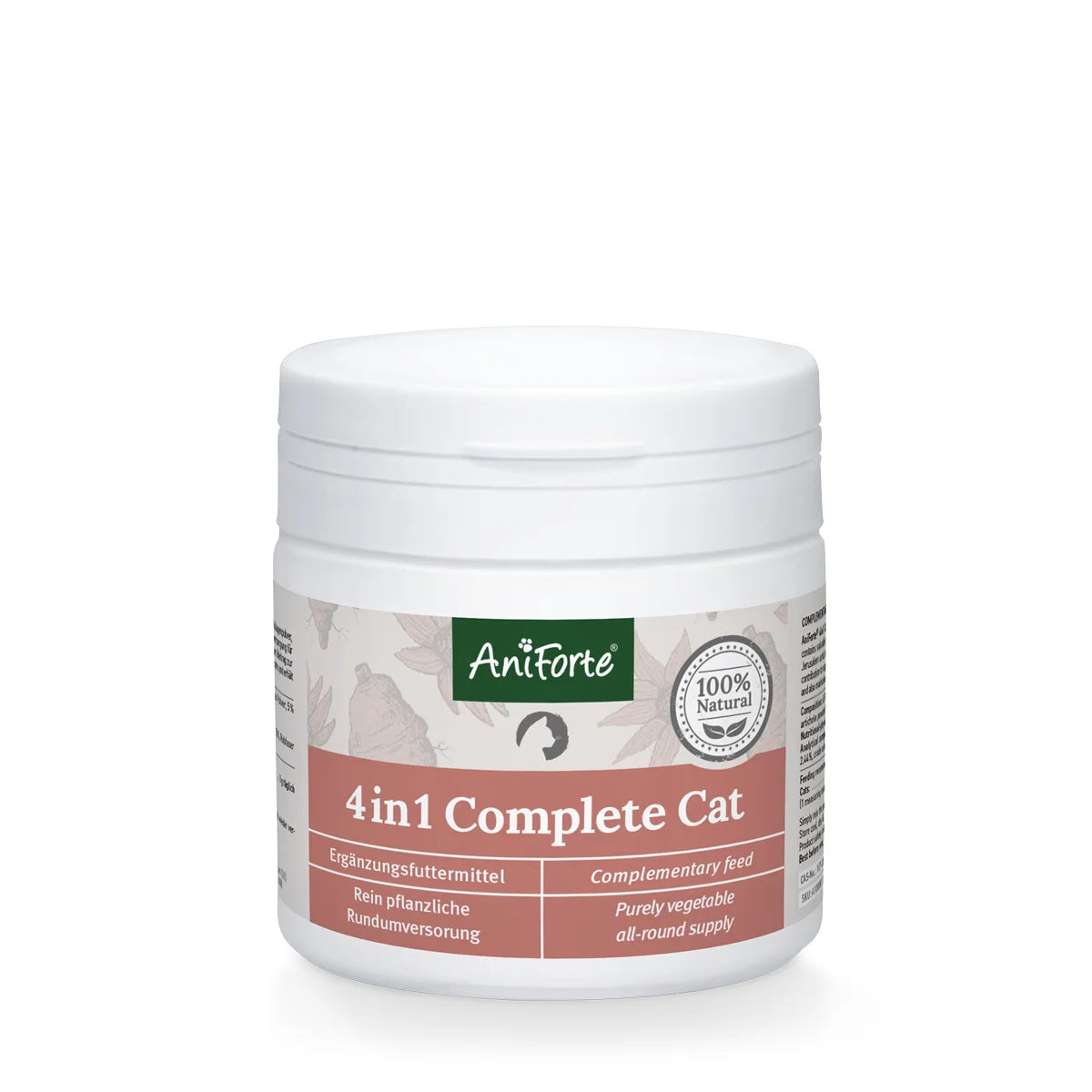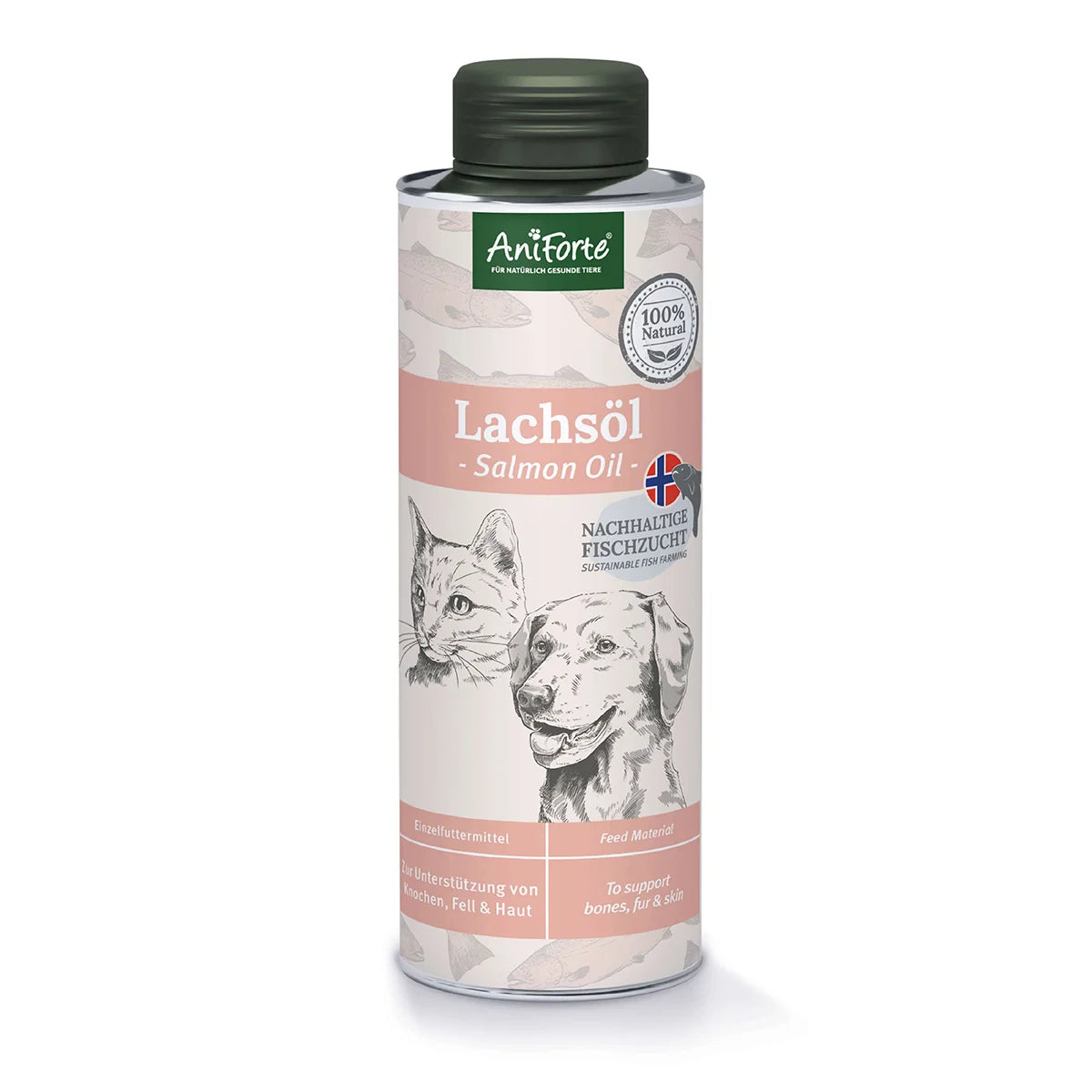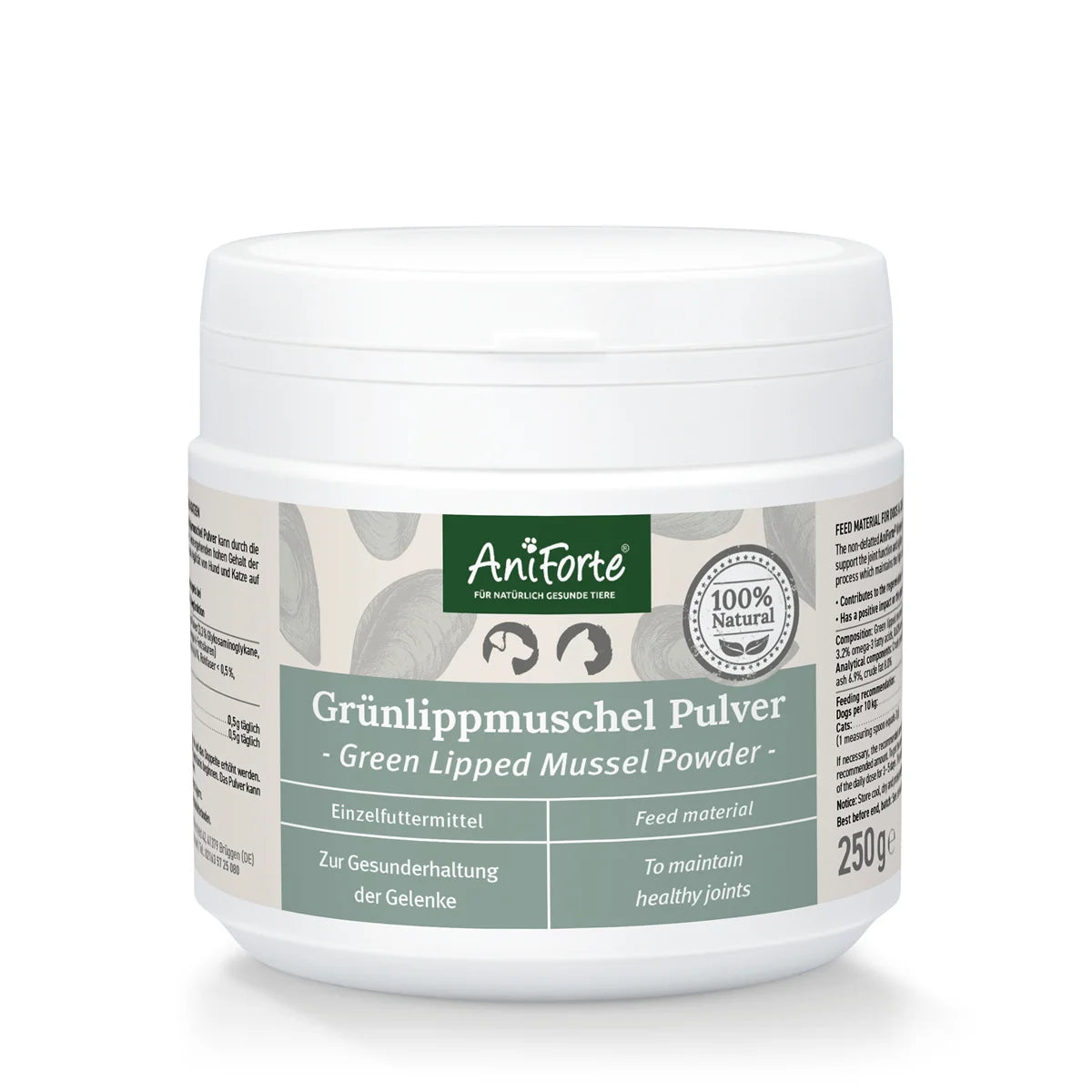
Salmon oil for dogs and cats is a healthy addition to their daily feed. This natural oil offers many health-promoting ingredients and has proven itself a valuable supplement for animals. The fish oil is 100% salmon and gives every food a fishy taste and smell. This is very popular with most dogs and cats and encourages them to eat. Salmon are fatty fish and have a particularly high content of essential fatty acids. If dogs and cats are not adequately supplied with omega-3 and omega-6, deficiency symptoms can occur, which may lead to long-term health consequences.
The effects of Salmon Oil on Dogs and Cats – how healthy is Salmon Oil?
Salmon oil contributes to a species-appropriate diet for dogs and cats. The purely natural oil contains valuable vitamins, minerals and above all: healthy fats. The essential omega-3 fatty acids in particular are not only essential for humans, but also for dogs and cats. These essential fatty acids cannot be produced by the organism and must be supplied with food.
The effects of salmon oil on dogs and cats have been the subject of numerous scientific studies. The effect of salmon oil is mainly due to the two polyunsaturated fatty acids eicosapentaenoic acid (EPA) and docosahexaenoic acid (DHA). The long-chain fatty acids have anti-inflammatory properties and help to balance the omega-3 and omega-6 ratio in animals. While a high omega-6 content in the body promotes inflammation, a balanced ratio of fatty acids can prevent inflammation processes in dogs and cats.
Salmon oil can prevent nutritional health disorders and support the bone, skin and coat health of dogs and cats. The effects of salmon oil in animals also have a positive effect on the immune system and metabolism. Since the important omega-3 fatty acids can be found in the cell membrane, they also play a crucial role in brain and eye development.
The many benefits of salmon oil and omega-3 on dogs and cats at a glance:
- supports skin irritation and fur change
- ensures a shiny coat and healthy skin
- contributes to the elasticity of the skin
- supports with dermatoses
- involvement in cell construction
- can support the normal inflammatory response
- has a positive influence on blood circulation and cholesterol levels
- is involved in natural metabolic processes in the body
- has a positive effect on the immune system
- promotes the development of the brain, fine motor skills and visual acuity
Salmon Oil for puppies and kittens
Puppies and kittens in particular should be given salmon oil regularly. As the animals are in their growth phase the cells are dependent on adequate supply of the essential fats. Especially for the development of eyes and brain, young animals need the omega-3 fatty acids from salmon oil as these substances influence the membranes and contribute to elasticity and fluidity. Salmon oil can also help build bones and it supports the immune system in dogs and cats.
Salmon oil for senior dogs and cats
Senior dogs and cats also benefit from the effects of salmon oil as in old age the visual acuity decreases, concentration and memory also diminish. The omega-3 fatty acids in salmon oil can support brain function and contribute to improved eyesight. Many older animals have reduced metabolic processes so that inflammation heals slower and the immune system runs low. Here, the fatty acids in salmon oil can make an important contribution and both contribute to better wound healing and support of the immune system. Some researchers even suspect that the essential fatty acids can delay the aging process.
Omega-3-deficiency in animals
Omega-3 deficiency in dogs and cats can manifest itself in a variety of ways and go unnoticed over a longer period of time. Since the essential fatty acids are required for numerous processes in the body, a deficiency - depending on the severity - affects the entire organism. Young animals and seniors in particular depend on an adequate supply of healthy fats. Pregnant or sick pets should have a higher intake of omega-3 as well because they consume more and the body's processes need more nutrients.
Common symptoms of omega-3 deficiency in animals
- dry, flaky skin
- shaggy, lackluster fur
- itching
- delayed wound healing
- skin inflammation
- increased dermatoses
- Hyperkeratosis (excessive cornification) with severe fatty acid deficiency
- tiredness, fatigue
- weakened immune system
- omega-3 fatty acid deficiency in puppies can lead to growth disorders
A deficiency in omega-3 and excess in omega-6 promote the development of inflammation. While omega-6 promotes inflammation mediators, omega-3 has the opposite, anti-inflammatory effects. Untreated inflammation can be the basis for numerous diseases in dogs and cats.
In order to remedy an omega-3 deficiency in animals, you can use a food supplement with salmon oil every day. The intense smell of fish promotes your little friend's appetite.
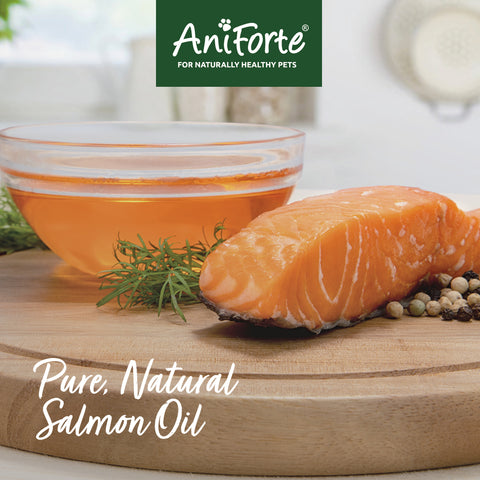
Dosage of salmon oil for dogs and cats
Salmon oil for animals is usually added to the feed. You can either use high-quality liquid salmon oil or salmon oil capsules. Both the oil and the capsules can be given long-term.
In dogs, the dosage of salmon oil is adjusted to the body weight. The bigger and stronger the dog, the more unsaturated fatty acids his body needs. In cats, on the other hand, the amount is constant in adult age, since size and weight are quite similar across different breeds. In contrast, pregnant and sick animals need an increased intake. The dosage of salmon oil for dogs or cats should be chosen according to the manufacturer's instructions. If there is any uncertainty, consult your veterinarian or alternative practitioner. As a rule, however, the following feeding recommendations apply to healthy animals:
- Dogs per 10 kg body weight: 1 teaspoon daily
- Cats: 1/4 teaspoon daily
Administering salmon oil to cats can sometimes be difficult. They are often very picky about their food and every new ingredient is critically inspected. For particularly demanding cats, start with just a few drops and slowly increase the dosage, so your little friend can get used to the salmon oil. Another option is to inject the natural oil directly into the cat's mouth. Salmon oil for cats should be chosen in a smaller bottle size so that the oil will not exceed its best-before date.
Many manufacturers have now added the valuable omega-3 fatty acids to dog and cat food. The higher the percentage of omega-3 in the finished food, the more effective the fatty acids are in the body. However, the amount of healthy fats in finished feed is usually rather small, so that supplementation with salmon oil is advised even still.
Does salmon oil contain vitamin D?
In contrast to other vitamins, there are only a few foods containing significant vitamin D amounts; offal and fatty fish such as salmon for instance. This makes salmon one of the few natural sources of vitamin D. Pet owners are advised to regularly feed fish to their animals to support the vitamin D level.
However, the most important source of vitamin D remains the sun. We humans absorb most of our vitamin D supply through sunlight on the skin. Even though many researchers assume that vitamin D metabolism is similar to that in humans, it is not yet officially confirmed.
What is important about the quality of salmon oil?
The quality of salmon oil depends on numerous factors.To keep the good quality of salmon oil for dogs and cats constant even after longer storage, the oil should be filled in a dark container. This protects the sensitive components of the oil from light. In addition, salmon oil should not contain any unnecessary additives or vitamins. Cats, especially because of their low weight, can quickly overdose on vitamins and minerals.
Salmon oil is a natural product, so a fishy smell is normal. Many suppliers add flavors to the salmon oil, but this does not only mask the fishy smell, but also masks rancid oil that has become bad. To be on the safe side, choose an aroma-free product.
Another important point in the quality of salmon oil is the proportion of omega-3 fatty acids. These should always be advertised on the package. The higher the fatty acid content, the better the quality of the salmon oil.
How long does salmon oil keep? Can it go bad?
Generally, the expiry date of salmon oil and salmon oil capsules is printed on the packaging. Otherwise the following rule of thumb applies:
- Salmon oil is stable for about one year. After opening, the shelf life can be guaranteed for up to five months.
- Salmon oil capsules have a longer shelf life than the liquid oil. Dogs and cats can take salmon oil capsules for up to two years after purchase.
- Both liquid oil and capsules should be stored protected from light and ideally in a dry, cool place.
- Salmon oil can be frozen if you feel you may not use before the best before date. We often freeze portions in ice cube trays!
Salmon oil vs. fish oil - what's the difference?
As the name suggests, salmon oil consists exclusively of salmon fish, also called salmonids. This fish can only be harvested in a controlled manner since the salmon population has declined sharply in the past 100 years. The advantage of salmon oil is that you know the raw material exactly.
Fish oil, on the other hand, is an oil obtained from several different fish, such as salmon, sardines, whales and many other fish. Several kinds of fish are processed at the same time. An oil may consist of cod, whale and sardine - sometimes even seal. Fish oil is not only used as a feed supplement, but also as a lubricant and release agent, as a leather fat and for rearing aquacultures.
Alternatives to salmon oil
Algae oil is a great alternative to Salmon Oil, vegan in nature, sustainable, and getting the omegas from the source meaning it is highly concentrated and only a tiny amount is required.
Vegetable oils are often mentioned as an alternative to salmon oil or fish oil. Due to its high content of omega-3 fatty acids, linseed oil in particular serves as a good option, because this oil is one of the omega-3 leaders among vegetable oils (100g linseed oil contain approx. 60g omega-3).
However, only alpha-linolenic acid (ALA) is found in vegetable oils, which needs to be converted to EPA and DHA in the body. However, the conversion rate is limited and varies between 5-10%, mainly depending on factors such as age, gender, and metabolism. However, the health-promoting effect is mainly due to the biologically active forms EPA and DHA. Vegetable oils are therefore not suitable as a substitute for fish oils if the content of the essential fatty acids EPA and DHA is to be increased. Salmon oil is still recommended for a targeted addition of EPA and DHA.
Especially in sensitive situations with a higher need for nutrients, supplementation with linseed oil may not be sufficient for dogs and cats because the conversion is not efficient enough. Nevertheless, vegetable oils such as linseed oil are known for their balanced omega-3 to omega-6 ratio.
Salmon oil for pregnant animals
Pregnant pets can also benefit from salmon oil. The valuable health-promoting effect of salmon oil contributes to improved nutrient supply. Just like us humans, animals in special situations such as pregnancy, illness or malnutrition need a higher supply of vitamins, minerals and healthy fats.
Salmon oil in pregnant animals can have a positive effect. It is being transmitted to fetuses and later by nursing to the offspring. It promotes cell building, is essential for the neurological development of the fetus and supports metabolism and immune system.
Studies have shown that puppies from bitches fed fish oil-enriched food had significantly better eyesight, growth and development than animals with a plant-based alternative. It is therefore recommended to give pregnant bitches an increased salmon oil dosage, but discuss with your veterinarian first.
Salmon oil for sick dogs and cats
The health-promoting effect of salmon oil is undisputed, and sick animals also benefit from the anti-inflammatory properties of salmon oil as many diseases can be attributed to chronic inflammation.
In studies, it was observed that supplementation with maritime omega-3 fatty acids increased EPA and DHA in the blood and also reduced inflammation levels. The supplementation with salmon oil is particularly beneficial for dogs and cats with arthritis and dermatoses.
The exact dosage for sick animals should first be discussed with the veterinarian.
Side effects of salmon oil
Even though salmon oil is a natural feed supplement and not a medication, it may still cause some side effects. The most common reasons for these are overdose or intolerance, depending on the individual animal.
Side effects of salmon oil that can occur:
- flatulence
- feeling unwell
- stomach pain
- loose stools or diarrhea
- In case of severe overdose: weight gain
However, these physical reactions seem to be very individual and depend on factors such as height, weight, illness and age. If your dog or cat shows any of these symptoms, the dose should be reduced first. If the animal continues to display side effects, the feed supplement should be discontinued entirely and the issue should be discussed with the veterinarian.
In addition, the very intense smell can deter picky dogs and sensitive kittens.
Conclusion
Salmon oil for dogs and cats contributes to their healthy and species-appropriate nutrition. It provides your pet with valuable vitamins, minerals and healthy fatty acids. Above all, the essential omega-3 fatty acids in salmon oil support the skin, contribute to an improved coat gloss and can compensate for deficiency symptoms.
Brittle fur in dogs and cats can be a sign that there is a lack of omega-3 fatty acids. With a daily intake of salmon oil, this deficiency can be compensated and secondary diseases can be prevented. Salmon oil for animals can be administered daily with the feed and should be stored in a dark and cool place.
